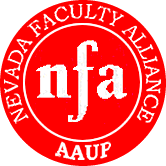I appreciate our State Senators and Assemblymen for this opportunity to speak on behalf of Nevada’s future in light of our current budget crisis. I appreciate the previous speakers for their input and views on Nevada’s budget crisis and Nevada’s future.
For decades, Higher Education has been underfunded. We are required to send our tuition and fees to the Nevada State Budget. Then, we are given 70% funding to do 100% of our job to provide access to quality higher education for all of Nevada. This is unheard of in the private sector. No private sector operation would exist if it paid 70% of what was needed to do 100% of the job.
The public and private are completely different entities. For example, the private sector has been experiencing a significant decrease in demand, which in turn, continues to result in pay cuts, hour cuts, and layoffs. However, public education, K-Graduate level, has had an increase in demand, and yet, you propose budget cuts, pay cuts, workload increases, and layoffs. Anyone taking one of economics courses can see the irrationality in this. You do not cut budgets, decrease pay, increase workloads, and layoff workers if your demand is increasing.
Higher Education has sacrificed significantly, ...You may not consider our sacrifices a sacrifice, let alone a tax. But, regardless what you label it, the undue financial burden/tax incidence imposed on State Workers, K-12, and Higher Education are regressive taxes that are not shouldered by the rest of the state. We have sacrificed COLA, Merit, medical/health benefits, retirement benefits, and salaries and wages. We have endured mandatory, unpaid furloughs, severe budget cuts, and significant workload increases.
At CSN, we have reached a point where many of us are buying our own teaching materials, office supplies, and technology to provide quality, innovative education for our students. Many earning a salary/wage less than $50,000 are facing home foreclosures, losing our vehicles, and worse – choosing between medical and dental checkups or paying other bills.
Further pay cuts, benefit cuts, and/or workload increases to those making $50,000 or less significantly is detrimental. It most likely will mean the loss of their homes and well-being.
Nevada State workers, K-12, and Higher Education endure the significant burden of shouldering the entire recovery with these significant tax incidences while many in our state and beyond are not paying their fair sacrifice to help the state recover from this excessive macroeconomic recessionary period.
Nevada citizens, particularly State Workers, K-12, and Nevada System of Higher Education, are very charitable and generous as we allow the same corporations in retail, gaming, services, and mining to operate with little to zero tax or fee in Nevada. However, they pay significant taxes and fees in other states and countries. We are a great group of people to subsidize education, the arts, mental health, welfare, elderly care/services, and prisons in other states and countries. It is comforting to know that we are helping so many others at the expense of our own children, education, and future. At least when we erode into a third world country our work has benefitted others outside of Nevada.
We are no longer able to shoulder the full burden of this recession and its recovery efforts. You, as our representatives, must take action on behalf of Nevada’s future and ensure that everyone, including businesses that are profiting from the current macroeconomic downturn, shoulder their fair share of the tax incidence, not just the taxpaying Nevada State Workers and the programs offered by Nevada for Nevada’s future, the K-12 education system and its employees, the Nevada System of Higher Education and its employees.
Remember, as Chancellor Dan Klaich has stated, “Higher Education is the solution, not the problem.
Monday, February 15, 2010
Shari Lyman (CSN-NFA president) comment to legislative townhall
Professor Shari Lyman, an economist and president of the CSN chapter of NFA, offered the following testimony to the legislative townhall this past Saturday:
Subscribe to:
Post Comments (Atom)






No comments:
Post a Comment